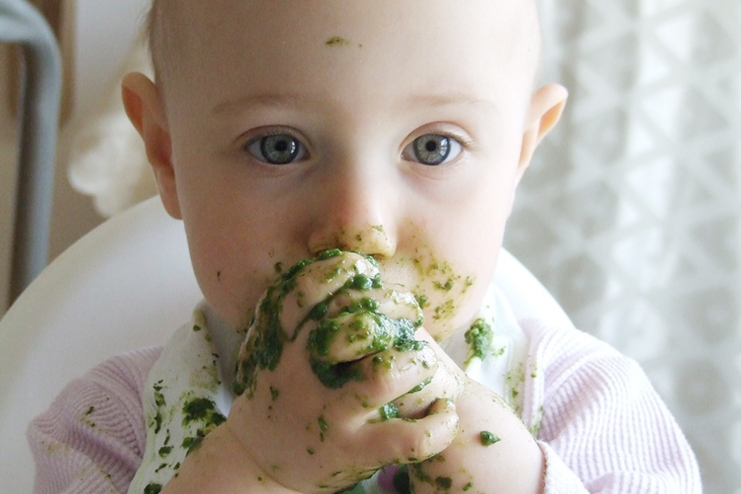Being a parent, you should know what is enough for your child and what is the standard amount of food that they should be fed with. And, you all know the importance of healthy eating. It is especially required for their growth and development.
Some kids are good when it comes to their eating habits and some are very fussy eaters. It becomes a big challenge for the parents to make them eat and this leads to force feeding.
Well, in this article, you will come to know a fair bit regarding what you are not aware of with respect to force-feeding and the effects it can have on a toddler.
What Is Force Feeding?
 Force-feeding is a practice of feeding against the will of your baby. As we know that being a parent, we always want to provide our kids with a better and healthy balanced diet.
Force-feeding is a practice of feeding against the will of your baby. As we know that being a parent, we always want to provide our kids with a better and healthy balanced diet.
The child food should comprise of carbohydrates, proteins, fat, vitamins and minerals. We should also feed your child at least one serving of 4-5 fruits and vegetables every day.
But force-feeding results making the child upset and irritated through the day.
Why Do Parents Force Kids To Eat?
 There are certain mistakes you often do as a parent while feeding your child especially when they refuse to eat. Some kids are good when it comes to eating habits and some are very fussy eaters. It becomes a big challenge for the parents to make them eat and this leads to force feeding.
There are certain mistakes you often do as a parent while feeding your child especially when they refuse to eat. Some kids are good when it comes to eating habits and some are very fussy eaters. It becomes a big challenge for the parents to make them eat and this leads to force feeding.
Some the common mistake you do while feeding your baby are as follows-
- Mostly you feed a child with your hand even when he can eat all by himself independently.
- Pressurizing the child to eat all the food that is there on the plate.
- Mostly all moms move around in the house with a plate in hand and telling the kids to eat the food.
- Normally you get angry or threaten your kids when he does not eat the food.
- Forcefully putting food into his mouth.
- Bribing him with chocolates or anything that he likes so that he can eat food well.
- Scolding or threatening a child to eat his complete meal.
- Feeding the child yourself although the child can developmentally eat alone
- Nagging her about food all the time.
Effects Of Force Feeding:

There are many negative and harmful effects of forced feeding in infants. Some of them are as follows-
- The first and foremost harmful effects of forced eating is that it leads to a loss of interest in children when it comes to eating.
- The children might overeat or under-eat when they grow up as many of the studies have proved.
- Eating disorders like obesity or anorexia might develop in children when they grow up.
- Children might develop a strong appetite for sweets instead of eating healthy food. This will hamper their need for proper and healthy diets.
- Force-feeding might lead to the destruction of your child’s natural appetite.
- Making a child to eat something they dislike might develop a lifelong aversion to that food group.
- Force-feeding results in children eating less in the short-term, not more
- Your child develops no control over her food habits. This will result in her overeating or under-eating as they grow up
- It develops a negative image for food and eating in your child’s mind
- It might make them hate food or fear of eating food.
- Force feeding leads to result in vomiting in most of the case.
Read also: how to maintain a healthy diet for kids
How To Stop Force Feeding Your Child:

There are certain ways that can work great in order to stop force-feeding in the child. Such as-
1. Feed Your Child When He Is Hungry:
This is one of the major checklists you can do to stop force-feeding. As a parent, you should feed your children when they are hungry and also make sure you don’t force them to complete their meals.
Force-feeding the child will lead to developing a negative image for food and eating habits. So, it is very important to feed them when they feel to eat or they are hungry.
2. Avoid Snacking:
Well, snacking is good, but not all the time in the day. If the child keeps on having to snack all day long, then it will kill their main meals appetite. This can lead to an unhealthy food practice for your kids.
Healthy snacks should be enjoyed mid-morning and the afternoon, or 2-3 hours between meals. Spacing out from the healthy snacking helps the kids to load up at meals times.
3. Healthy Choice:
A healthy choice is better than unhealthy food for the kids. The unhealthy food like chips, cold drinks, packaged food is not good for child health.
This food should be avoided by the kids’ diet but not completely.
Read also: how to maintain a healthy diet for kids
4. Let the kids decide:
Kids need to have some say in what they eat. Make sure you schedule regular meal and snacks times. Let them choose what to eat and how much of it they want. If you follow this step, definitely your kids will be choosing only from the foods you buy and serve.
5. Start them young:
Food preferences are developed in early in life for the kids. The children are able to differentiate between likes and dislikes by around 2-3 years so you need to serve a new food at different times for a child to accept and follow it. Don’t force a child to eat but you can ask them to try one bite with case of older children.
6. Rewrite the kids’ menu;
Do kids only want to eat hot dogs, pizza, burgers, and macaroni and cheese? When you eat out, make sure you let your kids try new foods. Always try experiment on various and different foods with kids. Just start by letting them try a little of whatever you have ordered or ordering an appetizer for them to try both of this works great. This will help the kids to come across various food and taste.
7. Drink calories count;
Calories count make sense a lot to stop force-feeding your child Soda and other sweetened drinks add extra calories and lead to good nutrition for the kids. A good amount of water, milk, healthy drinks are the best drinks for kids. The juice is fine when it’s 100%, but kids don’t need much of it. Only about 4 to 6 ounces a day is enough for preschoolers.
You can check with a few best healthy drinks for the kids here.
Force-feeding is a practice of feeding that is against the will of your baby. As we know that being a parent, we always want to provide our kids with a better and healthy balanced diet. The child food should compress of carbohydrates, proteins, fat, vitamins and minerals. All the factors are true but over forcing them leads to negative effects. Hope this article has conveyed a good knowledge about force-feeding.










































